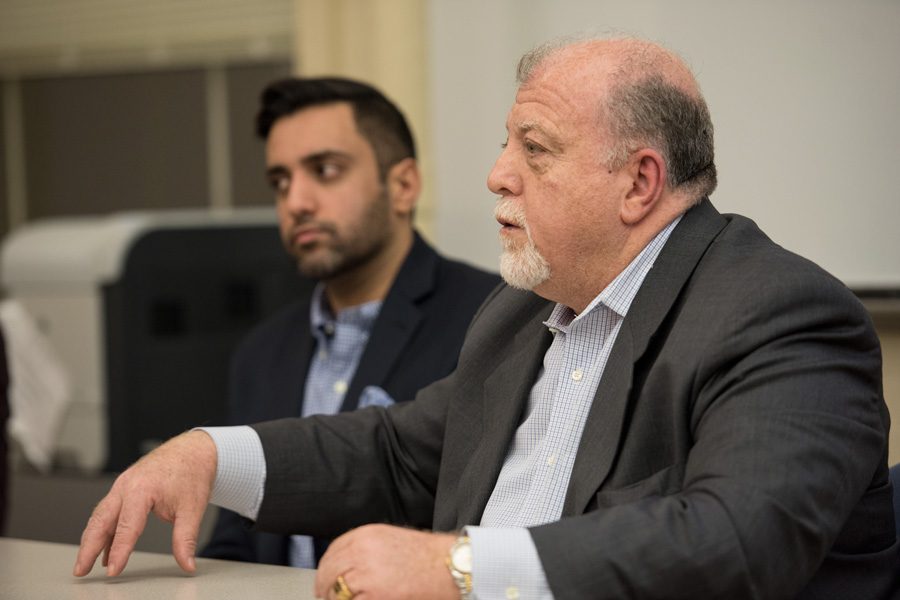Humanitarians address Syrian healthcare system, refugee crisis in discussion
Claire Pak/The Daily Northwestern
Dr. Mufaddal Hamadeh and Sufyan Sohel speak at a roundtable discussion about Syrian refugee health. The event was organized by GlobeMed at Fisk Hall on Monday.
February 28, 2017
In a roundtable discussion organized by Northwestern GlobeMed on Monday, local humanitarian leaders discussed the current state of the Syrian refugee crisis and urged students to take action by spreading awareness and volunteering.
Dr. Mufaddal Hamadeh, a board member of the humanitarian non-profit Syrian American Medical Society Foundation, and Sufyan Sohel, deputy director of a Muslim civil rights organization — the Council on American Islamic Relations in Chicago — spoke to about 40 people in Fisk Hall about health and legal services for Syrian refugees.
The discussion was organized by Northwestern’s GlobeMed as a way to inform NU students about the issue, said event organizer and GlobeMed’s co-president Nadia Ghazali.
“This is obviously such a relevant issue right now,” the Weinberg junior said. “A lot of people are interested, and there’s a great need for people to actually care about this, so that’s why we decided on this topic.”
The roundtable began with Hamadeh discussing the work that SAMS has done to provide medical services to Syrians. Before the Syrian civil war broke out in 2011, Syria had an advanced medical system, he said.
“Since everything (happened), Syria is in total devastation,” Hamadeh said. “That includes the health care system.”
The healthcare crisis was further perpetuated when many doctors fled the country to Europe and the United States, leaving medical students to perform life-saving surgeries, Hamadeh said. He added that trained nurses have also become rare in Syria, and that doctors are unable to provide necessary treatment due to a lack of resources.
“These are decisions no doctor wants to make,” he said.
SAMS works to build healthcare systems instead of just hospitals, Hamadeh said. These systems include underground facilities, medical education and telemedicine, which involves the treatment of patients through telecommunications technology.
Sohel joined the discussion and said life is not much easier for refugees even when they manage to flee to other countries. He spoke about the challenges faced by refugees and the effect President Trump’s recent executive order — which temporarily prohibited citizens from seven Muslim-majority countries from entering the U.S. and indefinitely blocked Syrian refugees — would have on them.
Although it is difficult for Syrians to leave behind the familiarity of their home country to go through a process of background checks and interviews lasting several years, Sohel said it is necessary.
“People aren’t safe anymore in those countries,” he said.
Sohel addressed efforts to fight the executive order, discussing lawsuits filed by the states of Minnesota and Washington, as well as the American Civil Liberties Union. Lawyers are taking action as well, he said, referencing the lawyers that worked to fight the travel ban at O’Hare International Airport.
The discussion was opened up to the audience, and students asked how they could become involved. Hamadeh said young people can contribute in various ways, including raising awareness about the situation, donating financially and participating in humanitarian work through organizations like CAIR and SAMS.
“My message to you is (that) this is what you need to carry on. Your politicians will follow,” Hamadeh said. “Don’t allow them to build these walls, and build bridges instead.”
Weinberg junior Tiffany Zheng said the event helped her understand more about the current refugee crisis.
“I learned a lot of not only the specifics of the process of becoming a refugee, but also the efforts that people are making to support this issue, like the things people are doing on the legal side and also the humanitarian side,” Zheng said.
Email: [email protected]
Twitter: @_janeyun


